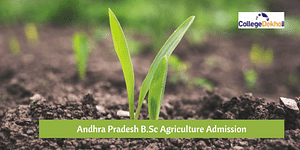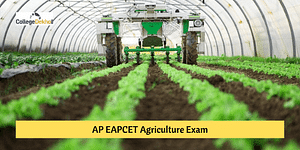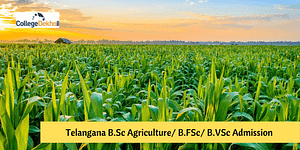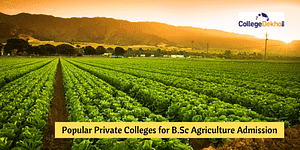BSc Agriculture
BSc Agriculture Course Overview
BSc Agriculture is a 4-year undergraduate course that mainly focuses on research perspective and practices in Agricultural Science. Bachelor of Science in Agriculture is a popular course that covers/ includes various disciplines such as Genetics and Plant Breeding, Plant Pathology, Agricultural Microbiology, Soil Science, etc. BSc Agriculture course is a professional degree in the field of agricultural science recognized by the Government of India. BSc Agriculture Syllabus is designed in such a way that it trains the students to implement modern agricultural techniques and technologies in the real-world scenario. BSc Agriculture syllabus is evenly distributed over 8 semesters covering all important topics. BSc Agriculture Subjects include Plant Biochemistry, Soil Science, Agronomy, Crop Physiology, Genetics, Entomology, Horticulture, Agricultural Economics, etc.
Candidates must ensure that they meet the BSc Agriculture eligibility criteria to be considered for BSc Agriculture admission. To be eligible for admission to the BSc Agriculture programme, students must have completed Class 12 in Science with a minimum of 50% in PCM/B (Physics, Chemistry, Mathematics, and Biology) subjects. BSc Agriculture admission is granted to the students on the basis of merit cum interview as well as through BSc Agriculture Entrance Exams. CUET, ICAR AIEEA, CG PAT, MHT CET, AGRICET, KCET, UPCATET, and other top entrance exams are required for BSc in Agriculture admission. Banaras Hindu University, Govind Ballabh Pant University of Agriculture and Technology, Guru Nanak Dev University, Amity University, Bharath Institute of Higher Education and Research, and other well-known institutions offer BSc Agri. The average BSc Agriculture fees ranges from INR 3.6 K to INR 9.6 Lakh. However, the average fee for BSc Agriculture varies from college to college and is higher in private colleges as compared to government colleges.
BSc Agriculture Jobs are available for the candidates for different job profiles such as Agriculture Officer, Agricultural Research Scientist, Business Development Executive, Assistant Plantation Manager, Marketing Executive etc. BSc Agriculture salary immediately after completing the course starts from INR 3.40 – 5.20 LPA for different profiles.
Table of Contents
- BSc Agriculture Course Overview
- BSc Agriculture Latest Updates
- BSc Agriculture Course Highlights
- Why Choose a BSc Agriculture Degree?
- What is an Online BSc Agriculture Degree?
- What is the Difference Between BSc Agriculture vs Diploma in Agriculture?
- Types of BSc Agriculture Courses
- BSc Agriculture Eligibility Criteria
- BSc Agriculture Entrance Exams
- BSc Agriculture Admission Process in India
- Direct BSc Agriculture Admission Process Without Entrance Exam
- BSc Agriculture Fees in India
- BSc Agriculture Syllabus
- BSc Agriculture Subjects
- Top Private BSc Agriculture Colleges in India
- Top Government BSc Agriculture Colleges in India
- Top BSc Agriculture Colleges Offering Direct Admission in India
- Career Options After BSc Agriculture
- Courses After BSc Agriculture Degree
- Other Popular Courses
- FAQs about B.Sc Agriculture
BSc Agriculture Latest Updates
BSc Agriculture admission is based on the CUET entrance exam. The CUET 2024 exam dates have been announced. The National Testing Agency will administer the CUET UG Exam 2024 from May 15 to May 31, 2024.
BSc Agriculture Course Highlights
Some of the major highlights of the BSc Agriculture course are as follows:
| Name of the Course | Bachelor of Science (BSc) Agriculture |
|---|---|
| Duration of the Course | 4 Years |
| Eligibility Criteria | Students with at least 50% marks in their 10+2 from a recognised board are eligible. Students must have studied Physics, Chemistry, and Biology at the qualifying exam level. |
| BSc Agriculture Admission Process | Both entrance test based and merit-based admission process |
| BSc Agriculture Average Course Fee | NR 3.6 K to INR 9.6 LPA |
| BSc Agriculture Average Beginning Salary | INR 3 LPA - INR 6 LPA |
| BSc Agriculture Job Profiles |
|
Also Read: BSc Agriculture Admissions 2024
Why Choose a BSc Agriculture Degree?
Students with a BSc in Agriculture can pursue a wide range of careers. They could study for an MSc or a Masters in Agricultural Sciences. There is also the option of pursuing an MBA/PGDM programme, which is widely available. There are also government job opportunities with IBPS, UPSC, FCI, and others. The student is qualified to take competitive exams for government jobs because they have graduated. Masters in Agriculture degrees are also available by taking one of several agricultural entrance exams, such as the ICAR PG, UPCATET, CMAFFU, and others. Once a year, colleges and universities hold entrance exams to select prospective students for PG courses.
The main reasons why to choose BSc Agriculture degree are:
- Innovation and Technology: The field of agriculture has benefited from a steady advancement in technology. There are numerous ways to use cutting-edge technology to enhance agricultural practises and crop yields, from genetic engineering and biotechnology to precision farming with drones and sensors.
- Diverse Career Paths: Obtaining a Bachelor of Science in Agriculture provides access to numerous career options. Agricultural researchers, extension officers, agribusiness managers, crop or livestock managers, food scientists, and government agencies involved in agriculture and rural development are some of the careers you can pursue.
- Entrepreneurship: Starting your own farm, forming an agribusiness, or creating cutting-edge agricultural goods or services are all viable options for entrepreneurship in the agricultural sector.
- Personal Fulfillment: A lot of people find that their work in agriculture fulfills them personally. It gives you a sense of connection to the land, the environment, and the fulfillment that comes from creating something necessary for human survival.
What is an Online BSc Agriculture Degree?
Agriculture provides food for a large portion of humanity. Many courses are available online that teach about various aspects of agriculture. BSc Agriculture Online courses enable users to learn more about a specific field. Online BSc Agriculture courses cover a particular topic over the course of a few hours. When the user finishes the course, they are given a certificate. These credentials are useful in the real world and help the bearer become more valuable to their employer. The course fee for BSc Agriculture online course is low, and the duration can be customised to the candidates' preferences. The courses are self-paced, which makes it easier for working people to adjust.
Online BSc Agriculture Admission
The following steps are required for admission to the BSc Agriculture Online Course:
- The online admission process is open to all students on a rolling admission basis throughout the year, though application deadlines may be set for each batch individually.
- The candidate must complete the form and submit it along with the required documents and photos.
- The candidate must review the admission criteria and select the appropriate course. The distance admission policy for BSc Agriculture varies by institute.
- Payment can be made via debit/credit card or DD to the relevant address.
- After payment, the student can begin classes immediately or when the institute specifies.
Agriculture Online Course Institutes
The most well-known online agricultural courses are listed below, along with the course name, duration, fees, and job scope.
| Course Provider | Course Name | Details |
|---|---|---|
| Coursera | Discover Best Practice Farming for Sustainable 2050 | Duration: 1-3 months Fees: Free |
| Sustainable Agricultural Land Management | ||
| Agriculture, Economics and Nature | ||
| The Economics of Agro-Food Value Chains | ||
| edX | Drainage in Agriculture | Duration: Self-paced Fees: INR 3,000 - 15,000 |
| e-Learning on Digital Agriculture | ||
| Feeding a Hungry Planet | ||
| Drones for Agriculture | ||
| Alison | Farm or Ranch Manager | Duration:4-5 hours Fees: INR 7,000 - 18,000 |
| Food Science Technician | ||
| Biological Technician | ||
| Environmental Engineer | ||
| FutureLearn | Antimicrobial Stewardship in Veterinary Practise | Duration: 5-6 weeks Fees: Free |
| Agriculture, Economics and Nature | ||
| Bushfires: Response, Relief and Resistance | ||
| Future Food: Sustainable Food Systems of 21st Century | ||
| AcademicEarth | Sustainable Living | Duration: Self-paced Fees: Free |
| Global Food | ||
| Food Producer | ||
| Language and Literacy |
What is the Difference Between BSc Agriculture vs Diploma in Agriculture?
The BSc Agriculture course covers a wide range of topics, such as Agricultural Management and Principles, to name a few. The table below contrasts other courses with the BSc Agriculture course.
BSc Agriculture vs Diploma in Agriculture
The following is a comparison of the BSc Agriculture and the Diploma in Agriculture:
| Course | BSc Agriculture | Diploma in Agriculture |
|---|---|---|
| Full Form | Bachelor of Science in Agriculture | Diploma in Agriculture |
| Stream | Science | Science |
| Course Duration | 3 years | 1 -2 years |
| Eligibility Criteria | 10+2 with PCB as a major combination with 50% as the total aggregate | 10+2 with 50% as the total aggregate |
| Entrance Exams | BCECE, PAU CET, JCECE | AP POLYCET, TS POLYCET |
| Top Colleges | Visvha Bharati, Chandigarh University, Amity University | Agriculture University, Aryans Degree College |
| Course Fees | NR 3.6 K to INR 9.6 LPA | INR INR 10K – INR 50K PA |
Types of BSc Agriculture Courses
The course can be taken either full- or part-time by aspirants. Here are the various BSc agriculture course types in more detail:
| Full-Time BSc Agriculture | Part-Time BSc Agriculture | Distance BSc Agriculture |
|---|---|---|
| There is a full-time, four-year BSc Agriculture programme. In this line of work, practical expertise supersedes theoretical comprehension. Students can interact closely with teachers and their classmates during a full-time course, which broadens their exposure to new ideas, experiences, and knowledge. | A part-time BSc in agriculture is offered. Practical knowledge is more important in this industry than theoretical understanding. The benefit of a part-time BSc in agriculture is that it gives students the freedom to work while they are in school. | Distance learning is the best choice for those who already have a bachelor's degree and don't have the time to attend traditional classes while pursuing a BSc in Agriculture. The completion time ranges between two and three years, depending on the candidate's schedule. |
BSc Agriculture Eligibility Criteria
The BSc Agriculture eligibility criteria are as follows:
- The candidate should have completed their 10+2 or equivalent from a recognized board with Physics, Chemistry, Mathematics, and Biology
- The student should be at least 17 years old, there is no upper age limit
- Students should have a minimum score of 50% in their higher secondary school examination or any equivalent examination
- Students must qualify the required BSc Agriculture entrance exam as some universities conduct their own entrance examinations
Required Skill Set for BSc Agriculture Course
Agriculture is a field that requires someone who is patient, pays attention to small details, and has excellent observational skills. Only those with a genuine passion for agriculture should pursue this field, as it is extremely demanding, and only the best will survive. Some of the skills required for a BSc Agriculture degree are listed below:
- Forward Planning
- Initiative
- Flexibility
- Good communication
- Analytical skills
- Commercial awareness
- IT skills
- Marketing & Sales Skills
BSc Agriculture Entrance Exams
Here is a list of some of the most popular BSc Agriculture entrance exams in India. Students can take these exams online if they want to get admission to various colleges across the country for a BSc in agriculture.
- CUET
- Rajasthan JET
- TS EAMCET Agriculture
- AP EAPCET Agriculture
- MP PAT
- UPCATET
- BCECE Agriculture
- CG PAT
- MHT CET
- KCET
- TJEE
- HORTICET
There are different requirements for BSc Agriculture candidates to sit for the entrance exam at various colleges/universities. The general format for these examinations is as follows.
- Exams can be taken offline and online
- There are both objective and subjective questions
- The college sets the curriculum. Some Physics, Chemistry, and Math questions will be followed by questions on Numerical Aptitude, Logical Reasoning, Verbal Ability, Reading Comprehension, and so on on the BSc in Agriculture entrance exams
- There is usually a time limit of 120-180 minutes
BSc Agriculture Admission Process in India
Each university has a different admissions procedure. Some colleges offer direct admission to BSc Agriculture programmes based on merit and a personal interview. Furthermore, certain universities, states, or national exams are used by some colleges to admit interested students.
- For Direct Admission
To be taken into consideration for the admissions process, students must submit their college applications, whether online or offline, before the application deadline.
- For Admission Based on an Entrance Exam
The registration form for one of the numerous BSc Agriculture Entrance Examinations, such as the KCET or KEAM, which offers admission into colleges in Karnataka or Kerala, respectively, must be filled out by students. Following the various rounds of counselling sessions, which typically include Group Discussion and Personal Interviews, admission is granted based on performance on these exams.
Also Read:List of Top Private Colleges for BSc Agriculture
Though the BSc Agriculture admission process varies by college, the following are the general steps to admission:
Step 1: Submit your BSc Agriculture online application.
Step 2: Pay the registration fee and any additional fees that may be imposed if admission is granted on merit. Entrance-based BSc Agriculture admissions require candidates to take and pass an exam.
Step 3: Candidates who have been shortlisted will be invited to the next stages of the selection process, which may include personal interviews, group discussions, or counselling.
Step 4: Once all of the preceding steps have been completed, candidates must submit all required documents and fees in order to be admitted to the BSc Agriculture programme.
Direct BSc Agriculture Admission Process Without Entrance Exam
Most colleges and universities based their BSc Agriculture admissions on merit. The selection of candidates for the Bachelor of Science in Agriculture programme will be determined by their performance in a qualifying exam, a series of in-person interviews, and/or a written 10+2 exam. In these situations, applicants are usually selected for further consideration based on both their academic standing and their performance on a prior relevant exam.
BSc Agriculture Fees in India
BSc Agriculture course fee can range from INR 3.6K to INR 9.6 Lakh. Depending on the BSc Agriculture colleges, fees may change. Because of its facilities and infrastructure, a government-based institute charges less than a private institute.
BSc Agriculture Syllabus
BSc Agriculture course curriculum is inclusive of class lessons, lab sessions, field trips, cattle training, practical training, etc. There are subjects such as Soil Microbiology, Plant Breeding and Genetics, Agricultural Economics, Agronomy, Plant Pathology, Statistical Methods, Post Harvest Technology, etc. that are included in the BSc Agriculture syllabus.
The entire BSc Agriculture course curriculum is divided into 4 years with each year having 2 semesters. A semester wise breakup of this undergraduate agricultural science course is mentioned below:
| BSc Agriculture Subjects Semester I | BSc Agriculture Subjects Semester II |
|---|---|
| Fundamentals of Agronomy | Fundamentals of Crop Physiology |
| Fundamentals of Genetics | Fundamentals of Plant Biochemistry |
| Fundamentals of Soil Science | Fundamentals of Entomology-I |
| Fundamentals of Horticulture | Fundamentals of Agricultural Economics |
| Rural Sociology & Educational Psychology | Principles of Organic Farming |
| Introduction to Forestry | Fundamentals of Plant Pathology |
| Introductory Animal Husbandry | Production Technology for Vegetables and Spices |
| Comprehension & Communication Skills in English | Fundamentals of Agricultural Extension Education |
| Agricultural Heritage | Food Processing and Safety Issues |
| Introductory Biology or Basic Agriculture 1 | Human Values & Ethics |
| Elementary Mathematics or Basic AgricuIture 2 | Soil and Water Conservation Engineering |
| BSc Agriculture Subjects Semester III | BSc Agriculture Subjects Semester IV |
| Crop Production Technology 1 (Kharif crops) | Crop Production Technology II (Rabi crops) |
| Practical Crop Production 1 (Kharif crops) | Practical Crop Production II (Rabi crops) |
| Fundamentals of Plant Breeding | Principles of Seed Technology |
| Agricultural Microbiology | Problematic soils and their Management |
| Agricultural Finance and Cooperation | Renewable Energy and Green Technology |
| Farm Machinery and Power | Production Technology for Ornamental Crops, MAP and Landscaping |
| Principles of Integrated Disease Management | Entrepreneurship Development and Business Communication |
| Environmental Studies & Disaster Management | Introductory Agro-meteorology & Climate Change |
| Dairy Science | Poultry Production & Management |
| Fundamentals of Entomology-II | - |
| BSc Agriculture Subjects Semester V | BSc Agriculture Subjects Semester VI |
| Rainfed and dryland Agriculture | Farming System, Precision Farming & Sustainable Agriculture |
| Crop Improvement-1 (Kharif crops) | Crop Improvement-II (Rabi crops) |
| Pests of Crops and Stored Grain and their Management | Manures, Fertilizers and Soil Fertility Management |
| Agricultural Marketing Trade & Prices | Farm Management, Production & Resource Economics |
| Protected Cultivation and Secondary Agriculture | Diseases of Field and Horticultural Crops and their Management-II |
| Diseases of Field and Horticultural Crops and their Management-I | Post-harvest Management and Value Addition of Fruits and Vegetables |
| Production Technology for Fruit and Plantation Crops | Watershed and Wasteland Management |
| Communication Skills and Personality Development | Beneficial insects and Pest of Horticultural Crops and their Management |
| Intellectual Property Rights | Elective-2 |
| Principles of Food Science & Nutrition | Educational Tour |
| Geo-informatics and Nanotechnology | - |
| Elective-1 | - |
| BSc Agriculture Subjects Semester VII | BSc Agriculture Subjects Semester VIII |
| General orientation & On-campus training by different faculties | Production Technology for Bioagents and Biofertilizer |
| Project Report Preparation, Presentation, and Evaluation | Seed Production and Technology |
| - | Mushroom Cultivation Technology |
| - | Soil, Plant, Water, and Seed Testing |
| - | Commercial Beekeeping |
The BSc Agriculture course also offers a number of elective subjects that a student can choose in the 5th and 6th semesters. List of these elective subjects are provided below:
- Agribusiness Management
- Commercial Plant Breeding
- Landscaping
- Protected Cultivation
- Agricultural Journalism
- Weed Management
- Hi-Tech Horticulture
- Agrochemicals
- Protected Cultivation
- Food Safety and Standards
BSc Agriculture Subjects
Here is a list of BSc in Agriculture subjects listed below:
| Principles of Crop Production | Fundamentals of Soil Science |
|---|---|
| Elements of Genetics | Agricultural Meteorology |
| Elementary Crop Physiology | Introductory Plant Physiology |
| Principles of Plant Breeding | Livestock Production and Management |
| Introduction to Plant Biotechnology | Silviculture |
Top Private BSc Agriculture Colleges in India
The number of private colleges offering BSc Agriculture is also endless. Private college fees are also extremely high. Candidates can look at the top popular private colleges that offer BSc Agriculture in the table below.
| Private BSc Agriculture College Name | Fee |
|---|---|
| Amity University, Noida | INR 4,00,000 |
| Bharath Institute of Higher Education and Research (BIHER), Tamil Nadu | 5,00,000 |
| Kalasalingam Academy of Research and Education, Tamil Nadu | 4,80,000 |
| KL (Deemed to be University), Andhra Pradesh | 8,80,000 |
| LPU - Lovely Professional University, New Delhi | 4,98,000 – 9,60,000 |
| Maharishi Markandeshwar University, Haryana | 3,60,000 |
| SOA - Siksha 'O' Anusandhan University, Odisha | 7,20,000 |
| SRM Institute of Science and Technology, Chennai | 8,00,000 |
| VIT, Vellore | 3,84, 000 |
Note: The figures mentioned above are subject to change.
Top Government BSc Agriculture Colleges in India
There are numerous BSc Agriculture government colleges where this course can be completed. The top popular government colleges that offer BSc Agriculture are listed in the table below for candidates' convenience. The list of colleges and their average fee structures is presented in alphabetical order and has nothing to do with the colleges' ranking.
| Government BSc Agriculture College Name | Fees |
|---|---|
| Banaras Hindu University, Varanasi | INR 26,930 |
| Govind Ballabh Pant University of Agriculture and Technology, Pantnagar | INR 1.17 Lakh |
| Guru Nanak Dev University, Amritsar | INR 2.6 Lakh |
| Odisha University of Agriculture & Technology, Odisha | INR 50,880 |
| Professor Jayashankar Telangana State Agricultural University, Hyderabad | INR 37,840 |
| Punjab Agricultural University, Ludhiana | INR 47,240 |
| Shivaji University, Maharashtra | INR 79,290 |
| Tamil Nadu Agricultural University, Tamil Nadu | INR 1.65 Lakh |
| Visva Bharati University, West Bengal | INR 3,360 |
Note: The figures mentioned above are subject to change.
Top BSc Agriculture Colleges Offering Direct Admission in India
The top BSc agriculture colleges in India according to the NIRF Ranking are listed below, along with an average annual fee.
| NIRF Agriculture 2023 Ranking | College Name | Fees |
|---|---|---|
| 1 | Indian Agricultural Research Institute, New Delhi | INR 43,000 |
| 2 | ICAR - National Dairy Research Institute, Karnal | INR 15,000 |
| 3 | Punjab Agricultural University, Ludhiana | INR 79,000 |
| 4 | Banaras Hindu University | - |
| 5 | Tamil Nadu Agricultural University | INR 50,000 |
| 6 | Indian Veterinary Research Institute, Izatnagar | INR 29,500 |
| 7 | Central Institute of Fisheries Education, Fishries University, Mumbai | INR 16,900 |
| 8 | G.B. Pant Universtiy of Agriculture and Technology, Pantnagar | INR 41,700 |
| 9 | Sher-e-Kashmir University of Agricultural Science & Technology of Kashmir, Srinagar | INR 31,500 |
| 10 | Chaudhary Charan Singh Haryana Agricultural University | INR 18,505 |
| 11 | University of Agricultural Sciences, Bangalore | INR 1,60,000 |
| 12 | Tamil Nadu Veterinary & Animal Sciences University | INR 33,500 |
| 13 | National Institute of Food Technology, Entrepreneurship and Management, Tamil Nadu | INR 1,72,000 |
| 14 | Chaudhary Sarwan Kumar Himachal Pardesh Krishi Vishvavidyalaya | INR 42,900 |
| 15 | Kerala Agricultural University, Thrissur | INR 60,000 |
| 16 | Bidhan Chandra Krishi Vishwavidyalaya | INR 6,000 |
| 17 | Dr. Y.S. Parmar University of Horticulture and Forestry, Solan | INR 49,700 |
| 18 | Anand Agricultural University | INR 22,500 |
| 19 | Assam Agricultural University, Jorhat | INR 20,300 |
| 20 | Acharya NG Ranga Agricultural University, Guntur | INR 27,900 |
Note: The figures mentioned above are subject to change.
Career Options After BSc Agriculture
Graduates from the programme can find employment in both the public and private sectors. Agriculture is becoming more and more important, which is leading to more job opportunities. In so many agricultural departments, extension services, research organisations, commercial farming, etc. There are numerous research projects and teaching assignments related to agriculture today. These professionals are paid an average annual salary that ranges from INR 2 to 8 LPA. It might be greater in the public sector.
After receiving a BSc in Agriculture, the position of Government of India Agricultural Officer (Agronomist) is among the most esteemed positions in the public sector. Other occupations related to the profile include:
- Agriculture Officer
- Assistant Plantation Manager
- Agricultural Research Scientist
- Business Development Executive
- Marketing Executive
Agriculture is regarded as the country’s backbone, therefore taking this degree will give you plenty of opportunities to conduct research and use current technologies for successful growth and higher crop yield. BSc Agriculture graduates can work in a variety of government, private, and public institutions, research centers, and agriculture firms. Following is a list of some of the most prevalent job fields after completing this course.
BSc Agriculture Job Description
Here are some of the most sought-after job profiles:
| Job Profile | Job Description |
|---|---|
| Agriculture Officer | Agriculture-related businesses and farmers are the clients of an agriculture officer. An agriculture officer's primary responsibility is to provide leadership in order to boost agricultural productivity. |
| Assistant Plantation Manager | The efficient and profitable management of harvesting and other operations connected to the plantation of crops or vegetables falls under the purview of the assistant plantation manager. |
| Agricultural Research Scientist | Research is where agricultural research scientists start. They are primarily concerned with the biological processes of various things and their relationships with products and processes. They include both lab work and fieldwork. |
| Agriculture Development Officer | An agriculture development officer, like an agriculture officer, works to increase soil productivity and other agricultural practises. |
| Agriculture Technician | By developing techniques to increase crop yield and safeguard animals from disease, agricultural technicians work in the fields of food, fibre, and animal research, production, and processing. |
| Marketing Executive | In order to maximise profits, a Marketing Executive promotes a product and develops sales strategies to attract customers and meet their needs. It is one of the most common job profiles in the business world. |
| Plant Breeder | Plant breeders create new strategies, tools, and technologies to increase the yield of India's major crops. |
| Seed Technologist | Seed Technologists assist seed growers by assisting them with seed equipment operations, seed planting, and seed scouting. |
Bank Jobs After BSc Agriculture
Banking and Insurance sectors are also filled with lucrative high-paying opportunities for BSc Agriculture graduates. Given below are the most popular bank jobs you can do after BSc Agriculture:
- Specialist officer (Agricultural Field Officer)
- Junior Agricultural Associate
- Field Officer
- Probationary Officer
- Rural Development Officer
- Agricultural Officer
UPSC- IFS (Indian Forest Services)
Many UPSC aspirants overlook this sector. It is one of the best jobs offered to BSc Agriculture graduates with a degree in Agriculture or related fields after they clear one of the most renowned UPSC exam. Candidates who qualify the written exams and the interview are appointed as a Deputy Forest Inspector, Assistant Inspector, Officer, etc. UPSC IFS offers a competitive pay fixed by the seventh central pay commission and is a lucrative and prestigious career path.
Food Corporation of India (FCI)
BSc Agriculture graduates can work at the prestigious Food Corporation of India. You can take up the online exam conducted by FCI for technical or non-technical positions. The profiles that are mostly offered are Technical Managers, Technical Officers, Assistant Officer, etc. It is a very good organization that pays well to its employees.
Indian Council of Agricultural Research (ICAR)
Falling under the Ministry of Agriculture and Farmers Welfare (GoI), ICAR is an ideal organization to work in for those who want to pursue a career in Agriculture. While working at ICAR you can pursue a job profile that deals in research and development. The job profiles usually offer at ICAR includes Technologists, Senior Research Fellows (Agriculture), Junior Research Fellows, etc. It can be a very good career option for BSc Agriculture students.
National Bank for Agriculture and Rural Development (NABARD)
NABARD is a well-known financial institution that recruits several Agricultural experts to work towards the Rural and Agricultural Development of India every year. If BSc agriculture graduates aspire to work in a bank then this is one of the best organizations where you can work as an Assistant Officer, Office Attendant, Agricultural Officer, etc.
National Dairy Development Board (NDDB)
Headquartered in Anand, Gujarat, NDDB works to strengthen farmer cooperatives and make dairy farming a profitable economic activity for milk producers in rural India. The NDDB implements various income-generating activities for dairy farmers, paving the way for their sustainable livelihood. The NDDB appoints graduates in agriculture for various posts like managers, deputy managers, and farm coordinators. Candidates can check the current vacancies on the NDDB site and apply online.
Also Read: BSc Agriculture vs BSc Horticulture - Which is the Best Option after Class 12th?
BSc Agriculture Salary
There are plenty of jobs in the Government as well as the private sector. For most Government jobs after BSc Agriculture, you would be required to pass certain competitive exams. However, there are plenty of jobs in the private sector as well where you can join without giving any exams. The salary you earn as a fresher after completion of your BSc agriculture degree depends on your job profile, employment type, employment organization, and location. The average monthly pay of an agribusiness manager is INR 27,386 whereas the monthly income of an agronomist is INR 18,094. With experience, the salary of professionals in the agriculture industry increases significantly.
Here are the major government and private jobs after BSc Agriculture along with the salaries offered:
| Job Profile | Average Salary | Highest Salary |
|---|---|---|
| Agricultural Officer | INR 9.5 LPA | INR 15 LPA |
| ICAR Scientist | INR 7.5 LPA | INR 16 LPA |
| Agriculture Analyst | INR 4.5 LPA | INR 6.5 LPA |
| Agriculture Sales Officer | INR 4.90 LPA | INR 10.2 LPA |
| Marketing Executive | INR 3.8 LPA | INR 7 LPA |
| JRF/SRF | INR 2.5 LPA | Varies |
| Research Assistant | INR 3.2 LPA | INR 4.5 LPA |
| Project Associate | INR 4.3 LPA | INR 6.2 LPA |
| Plant Breeder | INR 7.8 LPA | INR 14.5 LPA |
| Animal Breeder | INR 4.1 LPA | INR 12.2 LPA |
| Seed Technologist | INR 3.2 LPA | INR 5.4 LPA |
| Agriculture Technician | INR 3.6 LPA | INR 4.2 LPA |
Also Read: BSc Agriculture Salary
BSc Agriculture Industries
BSc Agriculture job prospects are available for the graduates in both private as well as government sectors. The candidates after completing their course are placed in different companies for multiple profiles and they can also work for state agriculture departments such as Research Officers, Agriculture Loan Officers (in banks), Development Managers, Quality Assurance Officers, Agriculture Officers, Logistics Managers, and Farm Managers due to the breadth of the programme. The students must focus on working in their core industries so that they will be able to contribute from their learning and help the organization to prosper under their leadership. The salary structure for BSc graduates is decent as mentioned above and they can earn a good living. Some of the key sectors or core industries where BSc Agriculture graduates can work are mentioned below:
| Pharmaceutical Industry | Research Centres | Actuaries |
|---|---|---|
| Chemical Firms | Public Relations | Academic Institutions |
Courses After BSc Agriculture Degree
Candidates who are ambitious may choose to pursue postgraduate studies after earning their BSc in Agriculture. They can choose to specialise in MSc programmes in forestry, plant pathology, agriculture, horticulture, or other related fields. After finishing a BSc in Agriculture, those with a business-oriented approach to the industry may choose to pursue an MBA in agribusiness management. After completing a postgraduate degree in agriculture or a related field, those who want to work as agricultural scientists or in academia must choose between a PhD.
Let's look at a few master's degrees in agriculture and its various specialisations before reading about the major career options:
- MBA in Agriculture
- Master’s in Environmental Agrobiology
- MSc in Agriculture
- MBA in Agribusiness
- MSc in Plant Pathology
- Master’s in Sustainable Agriculture
- MSc in Agricultural Economics
- MScAgric in Genetics
- Master’s in Agricultural Engineering
- Master’s in Agroecology
- Master’s in Plant Science
- Master’s in Agronomy
- Master of Food Science and Agribusiness
- MSc Genetics and Plant Breeding
Graduates from the programme can find employment in both the public and private sectors. Agriculture is becoming more and more important, which is leading to more job opportunities. In many agricultural departments, extension services, research organisations, commercial farming, etc. There are numerous research projects and teaching assignments related to agriculture today. These professionals are paid an average annual salary that ranges from INR 2 to 8 LPA. It might be greater in the public sector. After receiving a BSc in Agriculture, the position of Government of India Agricultural Officer (Agronomist) is one of the most esteemed positions in the public sector.
Other Popular Courses
FAQs about B.Sc Agriculture
Which after BSc agriculture course is the best?
Top programmes after a BS in Agriculture:
- MSc Agriculture
- MSc Horticulture
- MSc Dairy Science
- MSc Fisheries
- MSc Forestry
- MBA in Agricultural Management/Agri-Business Management
Which BSc Agriculture branch is the best?
The following is a list of some popular specialisations:
- Agronomy
- Horticulture
- Floriculture
- Farming Economics
- Forestry
- Animal Breeding
- Genetics in Agriculture
- Hydroponics
Is there a future for a BSc Agriculture degree in India?
Following a BSc in Agriculture, opportunities for competitive exams such as UPSC, FCI, and other government jobs abound. Many public and private companies offer jobs, and many students come for campus placements. Options include agricultural journalism, state government jobs, insurance sector jobs, research, and teaching.
What are the subjects taught in BSc in Agriculture?
Agronomy, Plant Breeding and Genetics, Soil Science, Entomology, Agricultural Economics, Agricultural Engineering, and other major subjects are covered in a BSc Agriculture.
Is BSc Agriculture an easy course?
BSc Agriculture is a simple course when compared to other Biology courses such as MBBS, BDS, Veterinary Science, and so on. In comparison, this course is simpler because it focuses on practical applications rather than learning. Qualification is not as important as on-the-job experience.
Is a BSc Agriculture a good course to take?
Yes, it is a very good course that increases your chances of having a good career after completing it because you will have a variety of options such as preparing for banking exams such as IBPS, SBI, Nabard, and so on. You can also apply for government competitive exams such as UPSC, FCI, IFos, AFO, and so on.
Is a BSc in Agriculture suitable for girls/females?
Yes, it is excellent. Young ladies should specialise in Horticulture, Plant Genetics, and Microbiology because these fields have a lot of opportunities and they can work for either the government or a multinational corporation.
Which is preferable, BBA or BSc Agriculture?
BBA is a business degree, whereas BSc is a science degree. Because India is an agriculturally based country, this domain will never let you down. BBA, on the other hand, is a better domain if you are interested in sales, marketing, and so on.
What copes exist after a BSc in Agriculture?
Following a BSc in Agriculture, opportunities for competitive exams including UPSC, FCI, and other government jobs abound. Many public and private businesses offer jobs, and many students come for campus placements. Options include agricultural journalism, state government jobs, healthcare sector jobs, research, and going to teach.
Which college places BSc Agriculture students the best?
The best placement is at Banaras Hindu University, then Delhi University, Amity University, Lovely Professional University, and so forth.
Which is better, BSc Agriculture or Engineering in Agriculture?
Your area of interest is really what matters. Go with only engineering or agriculture if you believe you have those genes in your family. Honestly, there are many more job opportunities in engineering than in BSc agriculture. Compared to engineers, agricultural graduates have better chances and opportunities to land government jobs.
Which state is best for pursuing a BSc in agriculture?
New Delhi is regarded as the best, followed by Mumbai, Chennai, Kolkata, Hyderabad, Bangalore, Pune, Ahmedabad, and others.
What is a good ICAR rank?
Very Good Rank in ICAR AIEEA 2022 for BSc Agriculture Admission are:
|
Category |
Very Good Rank |
Good Rank |
|
General (UR), EWS and OBC |
1 – 1,000 |
1,000 – 5,000 |
|
SC/ ST |
1 – 5,000 |
5,000 – 10,000 |
Is ICAR easier to pass than NEET?
Although the ICAR exams are not as difficult as the National Eligibility Cumulative Entrance Test-Under Graduate (NEET) or the Joint Entrance Exam (JEE), they must be passed in order to gain admission to a top university in India. To be chosen, you must have an ICAR rank of 500 or higher. To get into a top college, you must be in the top 150.
Can girls pursue agricultural studies?
Yes, girls who are interested in a career in agriculture should consider the BSc Agriculture programme. Crop production, animal husbandry, soil science, plant genetics, food science, and agricultural economics are just a few of the many diverse fields that make up the vast field of agriculture.
Is a BSc in Agriculture suitable for the IAS?
Agriculture is a highly rated optional subject in the UPSC civil services Mains exam. Aspirants with a background in Agriculture, Zoology, Botany, or a related field can choose this as an option for the UPSC IAS Mains Exam.
Which stream is best for Agriculture?
Following Class 12, the best Agriculture course a candidate can choose is BSc Agriculture. A postsecondary Agriculture faculty can award an undergraduate degree known as a Bachelor of Science in Agriculture or a Bachelor of Agriculture.
Which is preferable, B Pharm or BSc in Agriculture?
Both will give you good job opportunities, but Agricultural courses will give you a better future. Agricultural courses have a broader scope than paramedical courses.
What subjects are taught in agriculture courses?
The subjects and syllabus taught in agriculture courses are dependent on the type of agriculture course opted, i.e. whether it is a UG, PG or certificate/diploma courses, or even the specialisation or branch of agriculture courses. Some of these subjects include Principles of Agronomy, Economic Botany, Biomathematics, Livestock and Poultry Production, Green House Technology, Organic Farming and Sustainable Agriculture and more.
How to take admission in a B.Sc Agriculture course?
What is the duration of B.Sc Agriculture course?
What are the career options available after B.Sc Agriculture course?
What are the government job opportunities after B.Sc Agriculture course?
What is the eligibility criteria for admission in B.Sc Agriculture course?
What is the starting salary of a candidate with a B.Sc Agriculture degree?
Related Questions
Popular Courses
- Courses
- BSc Agriculture












